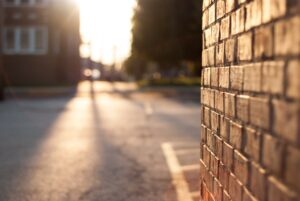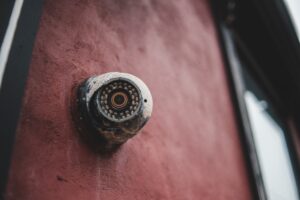The phrase ‘domestic CCTV system’ refers to the use of any video surveillance equipment mounted or fixed on your home. It can include cameras fitted to doorbells.
There are many domestic CCTV systems on the market to help you protect your home. If using CCTV, you need to do so responsibly and be respectful of other people’s privacy.
There are two main data protection laws; the UK General Data Protection Regulation (GDPR) and the Data Protection Act 2018 (DPA18) . It is important that your use of CCTV falls within these data protection laws.
If your CCTV system is set up to capture images within the boundaries of your private domestic property (including your garden), these laws will not apply to you.
However, if your CCTV system captures images of people outside these boundaries, the data protection laws will apply to you. (External boundaries include neighbouring homes or gardens, shared spaces, public footpaths and/or a street.)
Is CCTV the solution?
Firstly, it is always worth considering if CCTV is the best way to improve your home security. To help you decide, consider if there are alternative ways to protect your home (e.g. better external safety lighting?)
It is also good to consider what areas you want the CCTV to capture, and whether this will intrude on your neighbour’s property beyond the boundaries of your own property.
Furthermore, think about whether you need to record images or audio. Audio recording is very intrusive and, in most cases where householders use CCTV, audio recording ought to be disabled.
Secondly, think about the reasons why you feel CCTV might be beneficial. For instance –
- If using as a safeguard against crime:
Check the local police advice about crime prevention. For instance, better locks, security lighting, or alarm systems may be more effective. They are also less expensive ways of increasing security. - If using to monitor antisocial behaviour:
As stated above, it is important that your CCTV system respects other people’s privacy. We take a firm but fair stance against antisocial behaviour, supporting you, and keeping your community safe. Please contact us if you have any concerns, or wish to report antisocial behaviour in your community.
 What if I need to capture images beyond my property boundary?
What if I need to capture images beyond my property boundary?
If your CCTV captures images beyond your property boundary, such as your neighbours’ property or public streets and footpaths, then your use of CCTV is subject to the data protection laws.
Being subject to data protection laws means that, as the CCTV user, you are a data controller. As a result, you will need to comply with your legal obligations under the data protection laws. Whilst you can still capture images, you need to show you are doing so in ways that comply with the data protection laws and uphold the rights of the people whose images you are capturing. Essentially, you must have a clear and justifiable reason for recording people.
If asked by an individual or the Information Commissioners Office (ICO) , you will need to be able to explain your reasons for recording these images. It is better to be prepared should this happen, so write your reasons down in advance. You should also write down why you think capturing the images is more important than the privacy of neighbours and passers-by.
How do I comply with data protection laws when capturing images beyond my property boundary?
- Let people know you are using CCTV by putting up signs saying that recording is taking place, and why.
- Ensure you don’t capture more footage than you need to achieve your purpose.
- Ensure you are holding footage securely and making sure nobody can watch it without good reason.
- Only keep the footage for as long as you need to – delete it regularly, and when it is no longer needed.
- Ensure the CCTV system is only operated in ways you intend and is not misused. Anyone you share your property with, such as family members who could use the equipment, need to know the importance of not misusing it.
As stated, being subject to data protection laws makes you a data controller. Your duties include the following:
- Responding to subject access requests (SARs):
Individuals have a right to access the personal data you hold about them, including identifiable images. They can ask you verbally or in writing. You must respond within one month and give them a copy of the data. - Deleting footage of people if they ask you to do so:
You should do this within one month. You can refuse to delete it if you specifically need to keep it for a genuine legal dispute – in which case you need to tell them this, and also tell them they can challenge this in court, or complain to the ICO. - Consider any objection you receive from particular people about capturing their image in the future:
Some people may request to not be recorded. However, given the nature of CCTV systems, this may be very difficult to honour. Therefore, considering whether you need to record images beyond your property boundary is an important part of installing CCTV.
What happens if I break the data protection laws?
There are very serious consequences for breaking data protection laws. You may be subject to enforcement action by the ICO, which could include a fine. Consequently, you may also be subject to legal action by affected individuals, who could pursue court claims for compensation.
 What else should I consider before I install CCTV?
What else should I consider before I install CCTV?
It would be good to speak to your neighbours and explain what you are doing, listening to any questions they may have. Additionally, and where appropriate, it could be useful to invite your neighbours to view the footage you capture to relieve any concerns. This can also avoid disputes escalating, or complaints being made about your recording.
You should remember that your use of a domestic CCTV system may be appropriate, but publicly uploading or streaming footage of identifiable people would need more justification. This includes social media platforms. In most cases, it would not be justifiable.
You don’t need to register with the ICO or pay a fee. However, you must maintain records of how, and why, you are capturing these images and how long you are keeping them. You may need to make these records available to the ICO on request.


